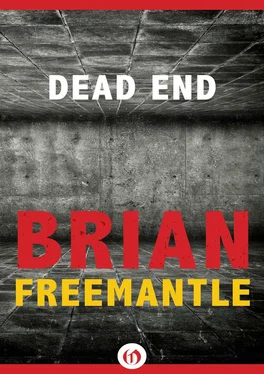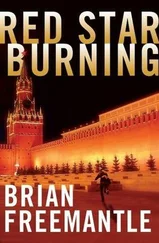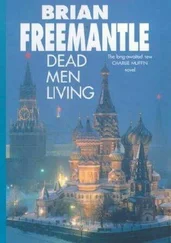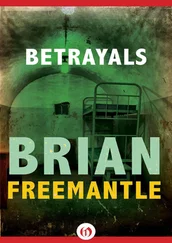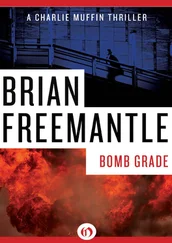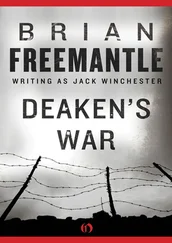Brian Freemantle - Dead End
Здесь есть возможность читать онлайн «Brian Freemantle - Dead End» весь текст электронной книги совершенно бесплатно (целиком полную версию без сокращений). В некоторых случаях можно слушать аудио, скачать через торрент в формате fb2 и присутствует краткое содержание. Жанр: Триллер, на английском языке. Описание произведения, (предисловие) а так же отзывы посетителей доступны на портале библиотеки ЛибКат.
- Название:Dead End
- Автор:
- Жанр:
- Год:неизвестен
- ISBN:нет данных
- Рейтинг книги:3 / 5. Голосов: 1
-
Избранное:Добавить в избранное
- Отзывы:
-
Ваша оценка:
- 60
- 1
- 2
- 3
- 4
- 5
Dead End: краткое содержание, описание и аннотация
Предлагаем к чтению аннотацию, описание, краткое содержание или предисловие (зависит от того, что написал сам автор книги «Dead End»). Если вы не нашли необходимую информацию о книге — напишите в комментариях, мы постараемся отыскать её.
Dead End — читать онлайн бесплатно полную книгу (весь текст) целиком
Ниже представлен текст книги, разбитый по страницам. Система сохранения места последней прочитанной страницы, позволяет с удобством читать онлайн бесплатно книгу «Dead End», без необходимости каждый раз заново искать на чём Вы остановились. Поставьте закладку, и сможете в любой момент перейти на страницу, на которой закончили чтение.
Интервал:
Закладка:
‘I hear there’s a big project underway?’ said Parnell, anxious to move the conversation on, accepting that this interview was a required courtesy – sympathy offered, help extended – but there seemed little point or purpose.
‘I told you it didn’t work…’ started Newton, but then, quickly, said: ‘The flu research, sure. We’re really under the gun on this one. You think you’re going to be able to help?’
‘Flu – animal and human – is viral, that’s how it’s medically feasible for those viruses to mutate into one killer strain,’ said Parnell. ‘And viruses have genes we can isolate and experiment with. Which isn’t a promise for any sort of discovery, just my agreeing with you and Russell Benn that it’s well within the pharmacogenomics discipline.’
‘You work closely with Russ,’ urged Newton.
‘I plan to.’
‘Remember everything I said,’ insisted Newton. ‘Don’t forget Dubette’s family orientation.’
‘I won’t,’ undertook Parnell.
Kathy Richardson was waiting for his return, jotting pad in hand, to tell him Barbara Spacey wanted to see him.
He said: ‘Call her back and say thanks but I don’t want – or need – to see her.’
‘She said you’d say that.’
‘Makes her good at her job,’ said Parnell. ‘Call her.’
It wasn’t until he recovered the papers that he’d abandoned on the Monday morning that Parnell properly recalled what he had been working on, the compilation of their separate cancer file, which he’d been in the process of subdividing, eventually to establish a working routine when it became a project for the entire department. Now there was another more urgent project, one it was important they devoted as much of their undivided attention to as possible, which meant the cancer undertaking would have to be further postponed. But then it always had been one for the future, when they had exhausted all the immediate examination of possible Dubette updates. He’d attach himself to the flu research, Parnell decided. It was the first specific demand that had been directed at them, so it was right – would be expected – that he should lead it, as head of the department. Parnell felt a flicker of anticipation: it would, in many ways, be getting back to the pure research he’d known on the genome project in England.
Parnell was reassembling the cancer folder, to give to Kathy Richardson to file, when there was a sharp rap at the door just ahead of the secretary’s warning, and the shawled and long-skirted figure of Barbara Spacey surged into his office like a ship under full sail.
The psychologist said: ‘You didn’t want to see me but I wanted to see you.’
‘And Dwight Newton can see us both if he bothers to look, so you can’t smoke.’
‘See the sacrifice I’m making!’
‘You needn’t. I’ve banned the remark from the department but for just one last time I’m OK and I don’t need counselling.’
‘How do you know?’
‘Because I do.’ Child-talk, he recognized.
‘Your fiancee just got killed and you got charged with it and there’s an FBI terrorism investigation linked to an obvious murder, and you’re telling me you feel fine and just want to get on with the job?’
‘No. I’m telling you I feel anything but fine, because how could I feel fine after what’s happened, and I want the bastards who did it caught. But that I’m not suffering any psychological problem. But if I begin to think that I am, I’ll come back to you, OK?’ How often, too often, that word, those two letters, entered every conversation!
Barbara Spacey pulled a chair forward, to be closer to Parnell, as she had been at their previous session, and slumped into it. The voluminous clothes concealed her like an enveloping curtain, but beneath the folds Parnell knew she would be overlapping the seat.
She said: ‘Sorry buddy. Company instructions. Every care for someone in distress. They want another assessment.’
‘I’m not in…’ started Parnell and stopped, his mind focused, far ahead of this conversation. ‘Two assessments?’
The you-know-how-it-is movement ruffled Barbara Spacey’s layers of clothes like feathers. ‘You really want to discuss – to try to discuss – the circumstances? Let’s give everyone a break here! How do families look after families?’
‘Most of the time by not smothering each other.’
‘No, that’s a cop-out. You realize how much support Dubette are offering?’
‘I won’t be smothered! The way it’s going, you’ll know – Dubette will know – more about me than I know about myself.’
‘Isn’t that what families do?’ persisted the woman. Her hands were twitching over her handbag, which Parnell guessed contained her cigarettes.
‘No, that’s smothering, as I already told you.’
‘I’ve got to do what I’ve got to do,’ said the woman. ‘Give me a break, OK?’
To co-operate would be the quickest way to get rid of the psychologist, Parnell realized. ‘OK.’
‘Tell me how you feel?’
‘I already told you.’
‘Tell me again.’
‘Confused.’
‘Frightened?’
Parnell examined the question. ‘No, I don’t feel frightened. I suppose I should, but at this moment I don’t.’
‘Why not? You’re right, you should.’
‘I don’t know.’
‘You think you can solve it, all by yourself?’
Parnell hesitated again. ‘No, of course I don’t think that! I’m a scientist, not a detective.’
‘But you’ve thought about it, solving it by yourself, exacting your own justice maybe?’
Barbara Spacey’s prescience was unnerving. ‘Sure I’ve thought about it! Wouldn’t anyone?’
‘I’m glad you’re being honest.’
‘How can you tell?’
‘We did this before, remember?’
Parnell didn’t. ‘Is that it?’
‘I think so.’ Her hands were actually moving, scratching at her handbag.
‘Do I get a copy, like before?’
‘It’s the law,’ she reminded him.
‘Like not smoking?’
‘What’s your point?’
‘What’s your verdict?’
Barbara Spacey smiled. ‘That confirms it.’
‘What the hell’s that mean?’
‘What I was deciding.’
‘You ducking my question?’
The psychologist shook her head. ‘You’re not so much of the asshole that you were before.’
For several moments Parnell stared at her across the desk, stunned. At last he said: ‘So, what’s that make me now?’
‘That’s the mystery,’ admitted Barbara Spacey. ‘I don’tknow.’
From behind the dividing glass between the two offices, Kathy Richardson was gesturing towards the telephone. To the psychologist, Parnell said: ‘Maybe you’ll never know. I analyse mysteries. I don’t want to have it happen to me.’
Barbara Spacey smiled. ‘I’ve got to go. I’m dying for a cigarette.’
Kathy Richardson was at the door, waiting to enter, as the psychologist left. The secretary said: ‘The FBI want a meet with you tomorrow, wherever you want. They’re suggesting ten o’clock.’
‘Tell them ten o’clock’s fine. At the Washington field office, to save him coming all the way out here.’
Fifteen
But for the fact that there was no facial resemblance – which didn’t alter Parnell’s immediate impression – the two men confronting him in the FBI’s Washington field office could have been twins. They were both of the same indeterminate height and build and wore their mousy hair short and neatly parted to the left. The spectacles were rimless, the style minimal, their faces unlined by apparent worry or concentration. They didn’t smile, either. The suits were grey, the faint check difficult to detect, the ties matching but subdued red. Parnell guessed the identical pins in their lapels represented a college fraternity. Howard Dingley, his seniority marked by his being behind the uncluttered desk, wore a signet ring on the little finger of his left hand. His partner, David Benton, didn’t. Instead a copper rheumatism-preventing bracelet protruded slightly from beneath the left arm of his double-cuffed shirt.
Читать дальшеИнтервал:
Закладка:
Похожие книги на «Dead End»
Представляем Вашему вниманию похожие книги на «Dead End» списком для выбора. Мы отобрали схожую по названию и смыслу литературу в надежде предоставить читателям больше вариантов отыскать новые, интересные, ещё непрочитанные произведения.
Обсуждение, отзывы о книге «Dead End» и просто собственные мнения читателей. Оставьте ваши комментарии, напишите, что Вы думаете о произведении, его смысле или главных героях. Укажите что конкретно понравилось, а что нет, и почему Вы так считаете.
